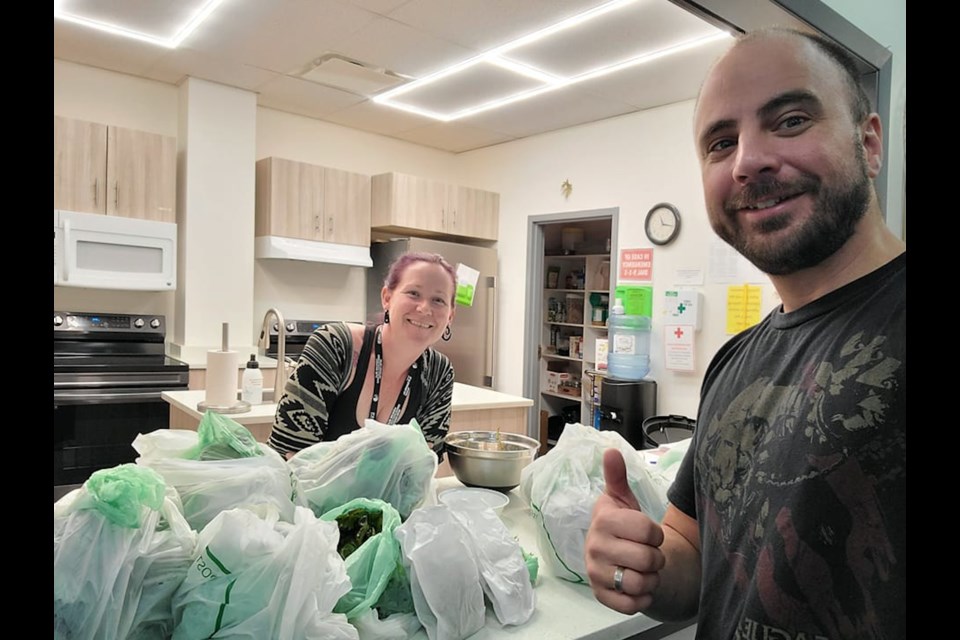Benjamin Feagin is painfully aware that food security in northwestern Ontario is a complex, multi-faceted problem that's not going to be solved overnight.
But after launching AgriTech North earlier this year, he and his partner are aiming to make the problem a little less daunting.
Based in Dryden, the indoor farming operation produces a variety of crops — from lettuces to herbs to fruits — that are distributed via subscription boxes to clients along a network stretching from Winnipeg to Dryden to Sioux Lookout. AgriTech is working on expanding that route to include Red Lake, Ear Falls, Fort Frances, Wabigoon First Nation and Eagle Lake First Nation.
Currently, the facility averages about 110 pounds (50 kilograms) of food per week, but once it’s running at full tilt, Feagin said, that will increase to 920 lbs (450 kg) of food weekly.
“We had been selling out each (harvest) cycle for the first five harvests,” Feagin said. “We’re just at the point now where we’re launching the remainder of the operation and about to more than double capacity to produce. So now we’re seeking more subscribers on the direct-to-consumer market, and we also have wholesale clients.”
AgriTech launched this past winter in a warehouse-style building on land formerly owned by the City of Dryden that had sat idle for more than a decade.
It was listed at $349,000, but under the Municipal Lands Disposition Program, which falls under the city’s Community Improvement Plan, the city provided AgriTech with a grant of $149,000 and then sold the company the property for $100,000.
From there, AgriTech gutted the inside and remodelled the interior to prep it for growing, adding vertical grow towers and specialized lighting to create a climate-controlled, pest-free environment.
“Everything other than the original slab and steel we’ve renovated,” Feagin said.
A scientific engineer by training, Feagin was living with his partner, Fabian Prince Velez, in the U.S. when COVID-19 hit.
Want to read more stories about business in the North? Subscribe to our newsletter.
During down time over the last few years of the pandemic, they had time to think about their impact in the world and began questioning what more they could do to make meaningful change.
With Feagin’s background in engineering and Prince Velez’s lifetime of experience in agriculture, the pair alighted on the idea of a year-round growing facility, with a particular focus on helping remote and Indigenous communities access fresh, nutritious food.
“We just wanted to give back to the community that raised me and be able to make the largest social impact we possibly could with our combined skills,” he said.
During a full year of planning, the pair relocated to Feagin’s hometown and began rolling out their business plans, which included enrolment in programs with RBC and Futurpreneur that offer mentorship and resources on building a business.
In August, Feagin was named an Emerging Indigenous Entrepreneur through the RBC Rock My Business program, receiving $10,000 to further develop the business. He was one of only eight award recipients in Canada.
AgriTech will use the funds this fall to launch a new e-commerce platform that Feagin said should ease the ordering process for both direct-to-consumer and wholesale clients.
On the wholesale side of the business, AgriTech is primarily targetting hotels, restaurants, and caterers — known in producer parlance as HORECAs — and he's already got some clients on board, including Pelican Lake Sandwich Company in Sioux Lookout and Log Cabin Tavern in Kenora.
The company also distributes bean sprouts to Indigenous soup kitchens in Winnipeg and is in talks with several restaurants and healthy food box programs.
"We're being very cautious about how quickly we advance those contracts because they're sizable and we want to make sure we have the capacity to produce reliably before taking on important contracts like that," Feagin said.
Getting their produce into grocery stores has been more difficult.
Most chains require producers to ship their product to a central warehouse in Winnipeg or Thunder Bay, which then distributes product to individual stores.
But through this channel, farmer profit is reduced to less than 30 per cent, which, in a high-capital, low-margin industry like agriculture, just isn't feasible, Feagin said.
"It's not cheap to grow year-round and, as a result, we can't sell to a third-party distributor."
His focus instead is reducing the inflated cost of food in remote Indigenous communities, which is often 10 times what a comparable community pays in the southern part of the province.
To achieve this, AgriTech is working directly with Indigenous-owned storefronts to establish the infrastructure needed to host fresh produce.
Feagin said he’s also working with partners to establish their own distribution channels that would eliminate minimum order quantities and reduce distribution costs to fly-in communities by 50 per cent.
It's taken longer than anticipated to get to this point, and the project is a few months behind schedule, but Feagin is still optimistic about its ability to positively impact the local food landscape.
As a young entrepreneur, he's appreciated the help he's been given and encourages patience, resolve, and transparency for businesses just getting started.
"Never feel discouraged that you can't go somewhere for help," Feagin advises in reflection.
"Be vocal about issues if you have them, especially with your funders, and make sure they know the pressures you're under; more often than not, they'll do what they can to help you navigate the issues you're experiencing.
"Just don't throw in the white towel."




